Fr. Ramon Santacana 神父沈拉蒙, James, Alexander Ramirez Bazan 拉尚德 & Chutinon Putthiwanit (Kim) 劉明星
Fr. Ramon Santacana 神父沈拉蒙
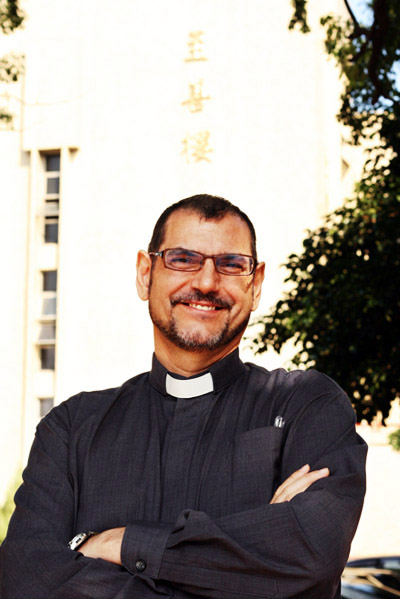
Why should students from around the world come to Providence University to study the in the Graduate International Programs?
Here we are we provide advantages. I think inside Taiwan Providence University has some advantages, especially campus environment and living costs. If you go to an area crowded like Taipei and so on everything is much more expensive and the quality of life is less. I’m talking pollution and noise…. Here is a very good campus. We have a lot of very good people who come here & who would like to stay here, yeah? We even…I know even some students that after one year’s studying Chinese they went to Taipei, and one year later they came back here.
Why?
Because they feel better here. Life is convenient. Here the weather is better, the atmosphere. [And], the people [are] warmer…the human relationship.
So, if we compare, in Taiwan, this is a nice place to be. I mean Taichung is a million people city, only the city. But, if you go around: its almost two or three million people. So it’s not shun shot – I mean you have a city. But, it is also a convenient city! You have everything, but it’s not something that is too much, too much big or something… So, I think it’s, it’…I’ve been here for 18 years, and I don’t want to change. Feel good here.
Why they should come to Taiwan and set of going to other places? Well, I think one important thing is here they get the Chinese culture…but it is a more international environment here. More contacts with the world: Taiwan there is a lot of contacts. I think that the Taiwanese economy – it didn’t develop by itself and – always contacts, always contacts and there is a very important entrepreneurial culture. Almost every house is a company in Taiwan! Every house, every house. Every family.
What will you teach the students?
I use my experience in international matters to give an idea not just local, from this local place. I give an idea international that in many places they don’t get. Even in Taiwan. Not even in the United States.
They’d need to go abroad to get a kind of international aspect. And the second thing is to blend values – human values – with business – that was my dissertation. So at the same time that we are considering business administration…don’t forgive values. Values are necessary.
Why did you choose to come to the Chinese culture?
I never regret it. I choose for two reasons: first – the biggest country in the world in terms of population. Second – a very difficult language, so very challenging, very challenging! At the same time the rewarding!
I am teaching business ethics this semester. And next semester I will teach international business management.
[The Graduate International Program at Providence University] is a very very big enrichment; not only for me but for all the students as far as we have in the same classroom ‐ I have people from, let us say, I have somebody from Taiwan, from mainland China from America, from Israel and from Thailand. So…it’s very interesting the interrelationship, the relationship interaction in the class with all the people, because I have … travel[ed] a lot in many countries and I relate to people from many different backgrounds.
But it is not just the places you travel because as you travel from one place you meet the people from that place. So, a little bit of that is coming to the class. And when you say something I think when a teacher says something [the teacher] should be aware of what the students [from other cultures] are going to think about that. … This experience has been interesting because when you say something you have to think about “What do they think, what do the others think, what do the others think and what do the others think?” And then the interaction when you are with this class – some subjects, some problems – because business ethics is, should be, a lot of interaction. You cannot impose to the students what is the moral rule or something like that. It should come from inside…the task of the teacher is help the students to … [bring out]something inside he doesn’t know how to express…he was not aware but [through] talking, talking, talking understands. And this is the most important thing.

Please tell us about your background?
I was born in Barcelona spent 50 some years ago and I studied there economics and theology. At the same time of…at the beginning when I studied economics I studied psychology. But, then I went to the military service and I couldn’t finish…. It was I mean, two…I mean two majors at the same time. They didn’t have the problem like they have here that they only do certain subjects and then you can have two majors – no. You had to study everything from the beginning, you know. So, I didn’t finish but I have three years background in psychology. So, I have a degree in economy, economy and management and I have a degree in theology and then later when I was in Taiwan already I went back to Spain and finished a PhD in international economy.
So, I’m curious. Why you would be interested in studying that. This academic route. And, what drew you to economics?
Well, my family they had the business.
What kind of business?
Wine growing, wine growers, wine. Very good wine. You know sparkling wine? Sparkling wine is like champagne. So, my family wanted me to have this background. By request of my father I did this background. I did these studies. I wanted to study the theology but my father said you have to study a civil study before the theology, and then you will decide by yourself. So, I did that. And at the end of the – when I was studying I combined the studies so the first three years I combined studying two majors and the second, because it was five years. So then I went to the, to the military service and when I came comeback started working in my family’s company to have some background, especially in marketing.
So, you ran a business before?
I did, I did. I have some background in that.
So will you also teach that in your class? About that kind of business reality?
Ahhh… When I was studying theology…then I worked as a full‐time professor at the same time, teacher and the high school, vocational school. So I was on the business area. So I was teaching something like that. On the business area.
Yeah, so, how long did you run that business?
I was working in business three years, yes and then I started with theology – I had been always working and studying. I never been very seldom been only a student alone.
When you were working in your family’s vineyard and winery which area of that enterprise did you find most interesting?
I really think its marketing. It was a family business so I just grew up inside almost inside the company So, I knew all the production problems all the production processes. So, so for me going into marketing was facing the outer world. So, it was something I didn’t know and something very interesting.
Can you tell us some kind of real cases?
Well, I was basically I was in charge of developing new products. OK, how to do that? Doing research about marketing, the market needs. Especially seeing how other companies performed – we had very successful companies in the area. The place where we worked it was a cluster for these kinds of products, so in the whole of Spain 90% of the production or maybe 95% of the production of this sparkling wine it was in the same very small area, like…four kilometers area.… So it was a very strong interaction and everybody was looking what somebody else was doing.
So, I entered into this world: about what the others were doing how they were performing… And then developing new products that… [researching what] proved to be successful…in other companies. So, it was like researching what is successful now and entering on that.
You know at that time, at that time it was very, very special the, using wood boxes – that was something new: wood boxes for the bottles, you know.
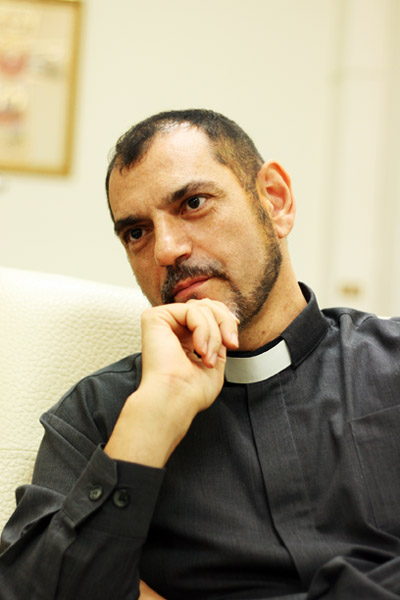
That was your idea?
More or less. With iron hot iron the name you know not painted [on, but] the name [branded on] – with hot iron, and these kind of things. Different kind[s] of bottle [closings]. Make this bottle and the whole product look…less industrial, less industrial‐produced. But more like, like family-produced, handmade. That was the challenge.
What did your family think of your performance?
Well they didn’t [want] me to leave….
I think that’s their loss!
I really had the feeling business was not for me, from the very beginning, yeah. It was a kind of helping my family. It was not because of money, but because of values. … In this case it’s Helping Family. But then it was a moment that I was 25 years old – I had to decide. I couldn’t delay any more. So, I entered the theology department.
And then there is a second part. When I started studying theology I wanted to learn languages. I wanted to learn more… What did I say to you before? “Opening to outside.” You know, the marketing it was a kind of opening, opening to the outside. And…kind of learning a language is a feeling like you want to know more, but what is here in your society you more less already know. You know a lot of it. And so I wanted to learn something. And then I chose German…I studied by myself. And then I stayed a whole summer…there.
What’s the year?
1985 – living in a family, and I remember that every time I wanted to talk in German… every time I open my mouth out came English. And I said to that family “I’m not going to talk in English anymore; if I cannot say something I will not [speak]”. And that was a very wise decision because otherwise I think I [would] never have [learned] German. And, I did learn something! So at the end of this half a year’s study and two months there I was able to communicate in very – maybe not a proper way because the German grammar is very difficult – but I was able to communicate and to say most of what I needed to say. And so it was very positive, it was very positive. But, I decided the German was too difficult.
Because I am not a perfectionist. And German: you should be a perfectionist to study German. There’s a lot of grammar, there’s a lot of proper things. Every word declines according to the gender according to…. A lot of declinations you have to be aware [of]. … And if you don’t speak perfect, I mean, it’s a mess. They may understand you but they have to do an effort to understand you.
And at the same time I [endeavored] to learn…German I [endeavored] to learn a little of a more difficult language. And then, of course, what languages I went to? Eastern languages. So, I considered Japanese, because at that time Japanese was very…

So that was the 1990s?
Near. ‘86. And said “No. I think that the place where there are more people living more things going on and so on is China. I’m going to try to learn Chinese. Bad Chinese! Not good Chinese. I mean the decision was to switch between [speaking German well and speaking Chinese badly]. So at the same time I need to learn good German I can learn [a little] Chinese. And of course when you start to learn a language then…[that] summer I went to China by myself. I took a trip
So what year?
’86.
Which city?
Everywhere! I entered by Hong Kong, Shenzhen, Guangzhou, Beijing, Hangzhou, Suzhou… Shenzhen was a little nothing. I remember it was only buses, small buses going to Guangzhou. And what was awful was that you sat in a bus and you wait[ed] for the bus to leave. And then the people saw there was another bus more full than yours and they went up and [took] the other bus, and the other bus left. And I was left alone there waiting for one more hour. I said “This is a new system. This is not something…I never saw, I never saw the system.”, you know? So, from the very, very first minute I put my foot in China I had to learn a new system, you know?
At that time you were already a priest?
No, no, no, no, no. I was a student.
So, Beijing. And then?
Xian. And then I went to Chen Du, Chung Hsing. And then I saw the three Gorges dam, then to Wu Han and Shanghai, and then I visited Hans O. Hsu Chou and I think I went back to Hong Kong.
So, how long did you stay in China at that time?
1 ½ months, including Hong Kong.
So almost every three or four days you changed your city?
Young people do these things.
So what did you discover at that time?
Well, very different culture!
Is that the first time you went to Asia?
Yes. Well you think that you [have] learned something because I [had] learned Chinese for [a while]…and you arrive there and you cannot talk; it’s useless what you learned!
How could you communicate with the local people?
That’s right! I remember I took a train from Guangzhou to Beijing and that was two days and ½ or maybe three days just being inside the train. And then they’re sitting there and I remember very well that sometimes people came and sat there [near me]…start a conversation. The conversation was:
“Hello.
Hello.
Were you from?
I am from Spain.
How old are you? [They were interested so…]”
And then I wanted to ask a question and I asked “What is your job?” and then the answer…I could never understand! Because there are maybe 20 different names or so…30 different names…I didn’t know so much Chinese. So, I said “Ohhhh…”. And that was the end of the conversations. And so, it was the same conversation…many times in the same day.
How old were you at that time?
Like maybe 27 or something like that 28?
What made you decide to study Mandarin further?
I had a very good friend he told me “I think you should go to China. You should go. I think your place is there, and so.” He was very sick, and the next year he died. After he died I said “Well, let’s see.” I mean as a student you don’t have much money. And so, and then I visited some travel agencies and I put a curriculum together and I said “I know Chinese. I’ve been in China and if you need a tour guide here, here.” And of course they said
“No.” “No.” “No.” “No.” “No.”
“Yes!” So, the second year I went to China with 30 people! So, after saying I will never be here anymore I went there with 30 people. And then I kept going: I decided every summer [would be] 30 people 30 days. It was tiring, very tiring. Now, they don’t do these kind of things [today]. It was by bus – half of it was by bus. We started from Hong Kong to Shan High: We did all the provinces by bus. 30 people. So there was 30 people 30 days.
From 1987?
Yes, it was like four years. ’87 ‘88 and ’90. So, maybe three years only…so it was like three times.
So, I had the opportunity to visit everywhere in China, you know. Something that I didn’t visit before; and something, helping people and doing these kind of cross cultural – because I was not, my work was not supposed to translate, we had a translator. But, my work was tour leader. Solve problems, especially it was a lot of cultural things. Because, our group was not high‐class group. So, usually, we went to halfway hotels. So, the halfway hotels: a lot of problems – they serve hot water… [our tour members] had never drunk in their life hot water! So, they had the cultural shock that they had to absorb. So, and all these things. I got a lot of experience.
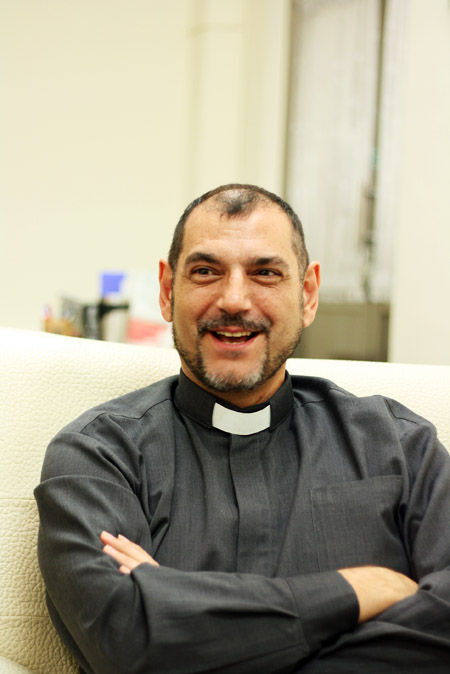
So, what caused you to come to Taiwan? What was the reason?
Well, I’d join the church here in Taichung. I joined the church in Taichung. The bishop of Taichung he studied in Spain. …He stayed many years in Spain speaks very well the language. He welcomed me very much to [Taiwan] to the diocese and to the university to teach Spanish.
So also at that time you had just finished your theology study?
I finished in the theology in 1990 then I went and one year to Nanjing and then I came here.
Describe your impressions of Taiwan.
[When I arrived in Taiwan there was}big demand of education… It seems that I fit in here quite well. The students I remember the students were very polite. I will [always remain] very impressed [by this].
Can you give us an example?
Oh, yes. Very impressed. Very impressed. Because I was teaching for less than two weeks and then it was Teachers Day. I got liked 20 cards – beautiful! “Lau Shu you are wonderful! You are…” And I thought “My goodness! I have stayed here less than two weeks and all these cards and all these things!” Never happened in my life. In the west there was no Teacher’s Day.
James

My name is James. I'm an American living in Taiwan, studying at Providence and teaching English to pay the bills. I love teaching and learning.
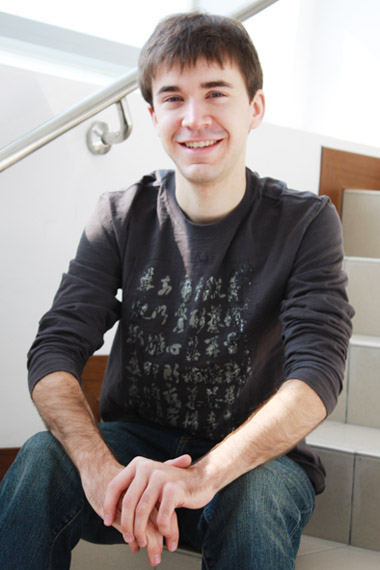
What are the Top 3 things that made you decide to study in Taiwan?
It's an excellent opportunity to continue my education while learning Chinese and experiencing life in a different culture. Moreover, to me Taiwan is one of the most interesting countries on the planet. It's a beautiful place where the mountains are fifteen minutes away from the cities and the history and culture are fascinating.
How will the major you chose help your teaching career?
My major is linguistics. Linguistics is very directly relevant to a lot of aspects of language teaching. Besides, linguistics is only one of three tracks offered by the English department. There are also literature and TESOL tracks, so I'm able to easily take some TESOL electives.
What has impressed you most about Providence University?
The faculty in my department are great, the library is great, and of course, Linda Lee in the International Affairs Office is awesome.
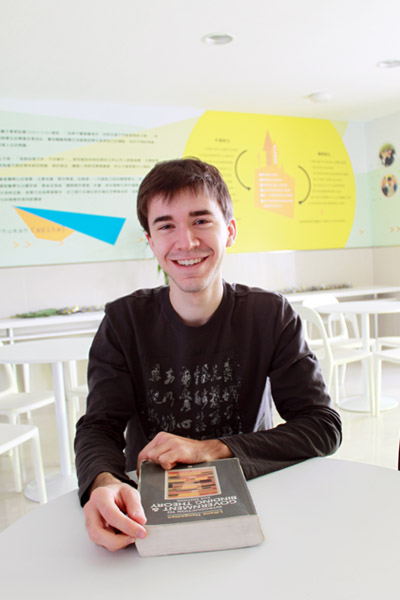
What course have you liked the most?
This is only my first semester, but my favorite class has been semantics.
What are your plans after graduation?
My dream is to pursue a PhD after graduation and eventually work at a university, doing research and teaching.
If people want to study, what would you tell them to encourage them to study in Providence University, Taiwan
I would tell them I've had a great experience here. The people are friendly, there are lots of resources, and it's just a great place to learn.
Alexander Ramirez Bazan 拉尚德
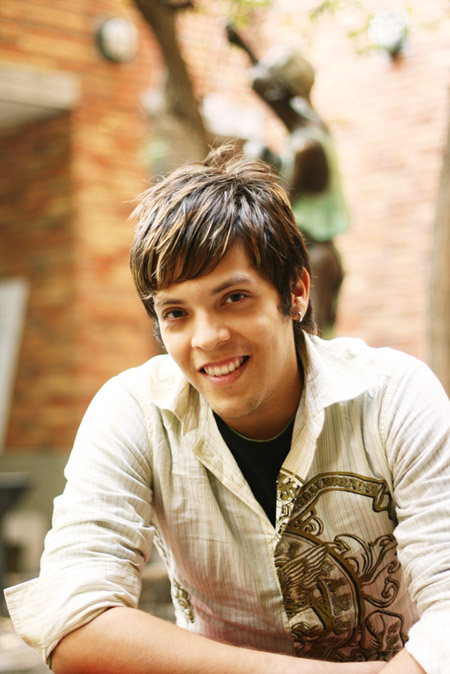
When did you come to Taiwan? What year?
2005.
Why did you come to Taiwan?
I came to study Chinese. One year of studying Chinese. After that, I applied to the Mass Communications Department.
So, when you came to Taiwan to study Chinese you already wanted to study in mass communications?
No.
Why did you choose mass communications?
In my future I want to make movies, [do] photography…. When I was in my country I learned some mass communications. For example, I learned journalism. I chose a mass communications because I was very interested…photography, movies, music, news...I like all” these things.
Do you have any connections in this field back home?
No.
I’m also curious ‐ why did you choose Providence University? There are a lot of universities, there are a lot of cities, counties in Taiwan…why did you choose Providence University?
When I was living in Paraguay I didn’t know the universities of Taiwan. At that time I had only a list of universities, a lot of universities, and I knew only that I didn’t want to stay in Taipei.
Why?
In Taipei there are a lot of foreigners so at that moment I thought if I go to Taipei…I would not practice my Chinese. [I would] speak English, speak Spanish. So, I choose Taichung.
Why not Kaohsiung? Why Taichung?
I knew that in Kaohsiung there were also many foreigners, [many] from my country also. Providence University is located in Shalu, a small town so…I thought I can learn Chinese more quickly.
And then I chose Providence University because one ‐ I stayed here the first year and I very much like Providence University. I think it is warm…we are family [here]. I really like the Office of International Affairs. They are so great. I also like the Chinese Learning Center. I like the many green [spaces].
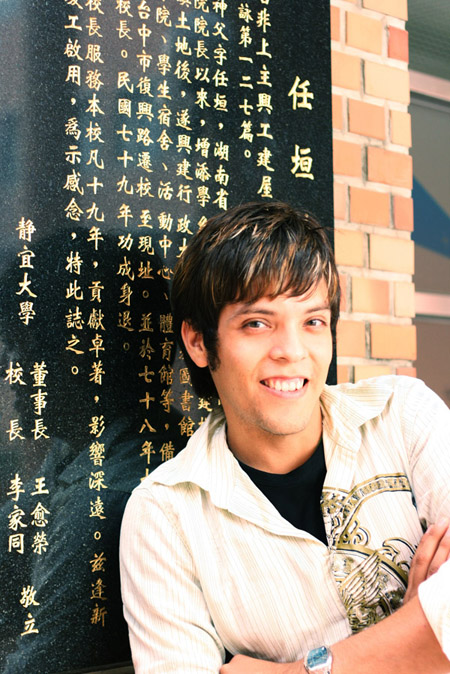
So, how’s your Chinese now? Have you taken any kind of Chinese tests? Like the tests of English Proficiency, the TOEIC, the TOEFL. I know Chinese also has those kind of tests.
Yes, the TOP.
Yes, the TOP! Have you tried the TOP?
Yes.
What’s your level now?
Intermediate
So, why did you choose to learn Chinese?
Because it’s a very important language.
Knowing English & Spanish already, with Chinese then you can communicate with the whole world.
Yes, I think so.
Other reasons to choose Providence University?
The first reason was because it was based in Shalu. The second reason why I wanted to study my major in Providence University is because I really like the school; the people – all the people are really very, very ‐ the teachers, secretaries, the director: I know many people of many departments, not only Mass Communications, also International Affairs, [the] Tourism Department, English Department, Business Department: all the people are very, very nice.
The people are friendly, and nice?
Yes!
The equipment? The other things? Faculty? Teachers? Classes? Can you describe something like that?
The classes are sometimes difficult but the teachers provide us with English textbooks and tests.
So, the teachers provide English classes for you?
No, no. The classes are all in Chinese. The textbooks and the tests will come in English.
OK, so the professors are really flexible with you guys? Are you the only foreign student in class?
In the mass communications department, four–year? Yes.
So, even though the teaching is in Chinese the professors will help you with English books. What else? The professor will be more concerned? Will pay more attention to you? Can you describe to me these things? What kind of support do you get when you are studying at Providence University?
For example if I don’t know what the teachers telling class he or she will give me extra time… Also we have a T. A.
Oh, you mean in the mass communications department?
I think it’s in every department.
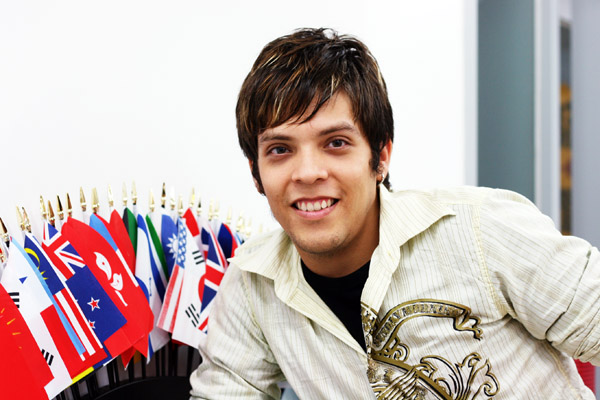
So, how do you pass this tests?
The professor knows that classmates will help me to better understand what the teacher has said; sometimes translate information that I don’t understand. And, then, at the same time, they improve their Spanish or English. The university also has a Spanish Dept so (they can help me too).
What do you think about culture in Taiwan?
I really like, I really like it. People are really very friendly. Comparing my culture to Taiwan culture ‐ they are very different. So, I like the situation because I can learn something new every day about the culture.
Paraguay is a Catholic country is that correct?
Yes.
Is that another reason why you chose providence?
Yes that was another reason. When I when I spoke with my mother and told her I chose Providence and also that it was a Catholic university she was very happy. She was really very happy. She said “Ah! OK.”
You could have also chosen Fu Re University in Taipei.
But, it is in Taipei.
Oh, you just don’t like Taipei.
I like Taipei for vacation, for fun but for studying I really don’t like… There are so many people and I really don’t like a place with so many people.
This immersion will be important for you to learn better if you have too many friends around you could easily get distracted and not practice your Mandarin.
I also really like the food. Of course, there are some kinds of foods and I don’t like but…
Like what?
Like… Stinky tofu. Pig blood.
So, that’s the thing that is impressed you the most about Taiwan culture the food?
The food and the religion.
Buddhism?
Yes, Buddhism.
And so far what do you think you have learned the best in your classes, without regard to Mass Communication or Business? Which classes you have learned of the best and why?
Let me see…one is Taiwanese culture.
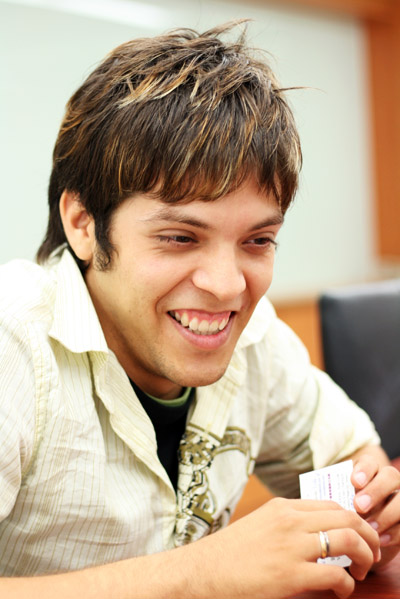
And?
This is a class for foreign students.
Oh! Just for foreign students.
Why?
Because you’ll know Taiwan better?
Yes. In this class we can discuss about the culture and not only Taiwan culture but my own culture all the culture of my culture my classmate’s culture.
And, what else?
Because, when I took this class we visited many places in Taiwan.
Have you done an internship? Do you plan to work in some kind of business in Taiwan to get some experience?
Yes, I want to.
What’s your plan right now?
OK, next year I will graduate.
What type of work would you like to do? Did you try to think about going into the media because you studied a mass communications?
For me it’s more difficult to work here in the media. So, I want to go into business. I know Taiwan has many companies that [do] business with Latin American countries.
Have you focused on any company so far?
Not yet.
Don’t worry…
For now, I want to graduate. After I graduate I want to stay here to work.
Have you thought about going to graduate school? Keep going for an advanced degree?
Yes. Maybe.
In Taiwan? Or, somewhere else?
I don’t know yet.
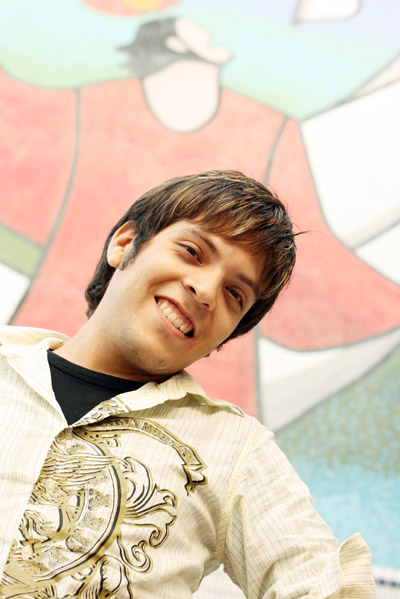
Can you give some kind of suggestion for students all over the world, foreign students who are thinking about coming to Taiwan. Please tell us why we should come to Taichung why we should come to Providence University.
I think coming to Taiwan is a better way to learn Chinese.
Why Taichung?
Because Tai Chung is very nice place and it is a modern city. And there is a very low cost of living. The people are friendlier. [At Providence] they really give you support, make your studies a lot easier. Providence university you really helps foreign students.
Students who want to come to Taiwan, they [should] choose Providence University. It’s a very good choice because if you want to learn about the culture and about the people [of Taiwan] in Providence they have many classes about the culture about the Taiwan. They are really very supportive of foreign students.
Can you give me more examples about how they support foreign students?
They have many activities for foreign students. Also, when we have any problems they have a 24 hour telephone line for us to call. Inside the university or outside the university we can call them.
And, you just mentioned Latin America. So I think maybe you can say something to those people.
Come to Providence University.
Why?
Because it is really a very good university. The buildings of the [campus are all] very good. All of the university is very new. Many green spaces. Every department offers great treatment. They very support foreign students. I think the location university is good for studying Chinese.
Chutinon Putthiwanit (Kim) 劉明星
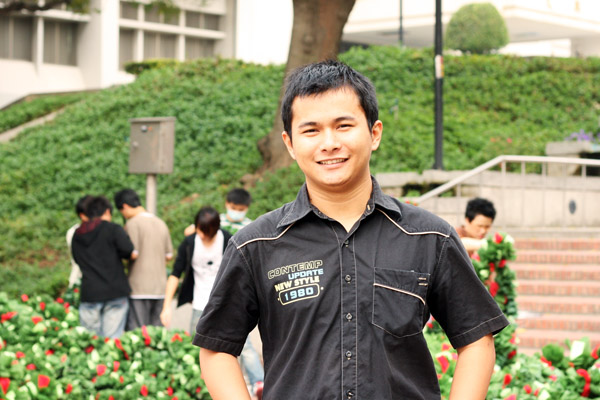
Why did you come here to study?
Have heard so many stories and people say that If you want to learn the real Chinese culture and the real Chinese language you better choose Taiwan.
Why do people say that?
Because in Taiwan you have to study the traditional Chinese and the full character and it is quite tough for you because you know if you study simplified, yeah, it is quite OK, but you don’t really understand the root of the word and the radical of the word. And, also my grandfather came from mainland China, actually….
Fukien Providence?
Yeah, Fukien Province. But anyway he’s Fukien and I have heard for the Taiwanese language they are quite a bit similar
So your grandfather still speaks of Fukien Mandarin?
Yes, he speaks Fukien Mandarin. But he said that our surname in Mandarin they say "Liu" but in Fukien they say "Lau". Therefore, my surname should be pronounced “Lau” Ming Shin. So, but anyway, he passed away a few years ago. So I feel bad sometimes you know why didn’t I spend some time studying about his background, but right now I have a chance! I feel nice to be here and, yeah, there is some similarity in the culture between Taiwan and Thailand therefore I think when I come here at least I can learn more about the culture and maybe someday when I go back to my country at least at least I can tell my people about Taiwan culture and maybe we can increase about mutual understanding between the two cultures.
OK. But, why did you choose the MBA program?
Basically I chose to study the MBA program at Providence University because I like their curriculum and also I think it best for me personally. It’s the best curriculum in Taiwan for MBA. They offer – because usually, for other universities, though they offered Chinese culture for you but they do not count it as a credit. In Providence University for the MBA program Chinese is a required course that you are have to study for nine credits. Therefore, [though the] whole program is in English but…when you graduate from here you have some background in Chinese because I think that one course is important for this program.
And, also, for the course majoring in business administration they also offer a variety of courses and subjects that are quite updated to the current economic situation. For example, we have some courses like global business ethics that encourage students: OK you can do a business ethically. Because you can see that the current crisis in the USA has been caused by people who just seek for the profit only. But [in Providence University students] will see – OK what will be the effect on the whole society. So, this subject is quite interesting for me. And we have some subjects like Internet Marketing….
[And] at Providence University even though you are studying business you have to know how to conduct research and you have to know how to write academic research. Because, even though you have graduated, you have your thesis that you have done for many months – maybe one year, and you have a lot of determination to do it. But, if you graduate and, you know, just put your stuff in the library it’s nothing! But [at] Providence University the teachers encourage students to do a master’s thesis, and after that you will have a chance to be published and join an international conference. Because in Providence University, apart from the MBA faculty we have, like, our research and development section that we encourage students [who] would like to join international conferences for academic writing…. We have reimbursements for traveling to the – it doesn’t matter if you want to join maybe in Europe or the USA, the university will provide 50% of the air fee for you! So, it’s something that other universities don’t really have.
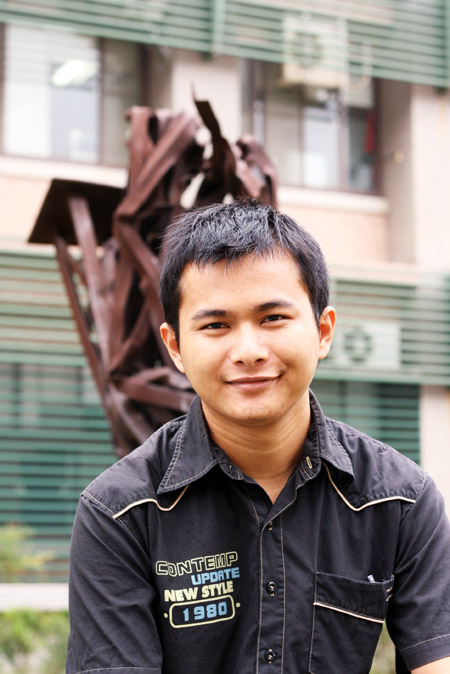
And, also, for Providence University – how about the faculty? How about the curriculum? Even the location here in Taichung? Was that also one of your considerations to come to Providence University?
Exactly! I have my friend, he’s American. He spent…I think eight years here already. And, he said, that Providence…
Because your major was Applied Statistics you definitely will do a lot of research…
Exactly! Because when I graduated from Thailand so I think about start working immediately or studying further and I had some interviews – with two companies: Exxon Mobil and one research company and there was one question an interviewer asked me that made me think about it. He said “OK. You graduated from applied statistics. You know a lot of numbers. You know how to analyze the data but” he asked “do you have much idea about the business? Because, you’ll have to deal with a lot of business people. Do you know a lot of marketing?” and he asked me like that – even the way people dress it can tell you a lot of the market thing it can tell you a lot about that person’s personality. So, then, when I just came back from interview I thought about it. Yeah – even though I have knowledge I think I would like to have more and that is the reason why I came to Providence University. And so…
But, there are many MBA programs in Taiwan and even in China and you study here. There must be some reason.
Because Providence University has connections with my university in Thailand – Assumption University. And Providence University has many things similar to my university. For me, for an international student [who] would like to study abroad I think that if they have never been to Taiwan before they will have some problems like culture shock. Therefore, when I looked, it had so many things similar to my university so that’s one reason why I would like to come to here.
And also it is located in Taichung and [in] Taichung the weather for the whole year is not too cold.
So, you did study that?
Yeah. I researched everything for the weather, for the typhoons for the earthquakes – oh my God! It provided good statistics for that. The number of earthquakes: not so often in Taichung. Typhoons? Here – but not often compared to Pingtung, Hsin Chu, Kaohsiung: [those places] have a lot of typhoons. And, I thought “I have to spend two years here…” Because so many people ask me why don’t you study at Shi Da, Taida, Sun Yat‐Sen University? They said that “They also provide academic and they are worldwide academic standard, but I have to factor, you know, like, typhoon and earthquake. So, that’s the reason I study here – real life.
Also, I have looked at the university rankings and I have looked at many web sites…[and I found that] though Providence University is a private university, but for the ranking it ranks around number 13 in Taiwan. So, it is quite tough, yeah. So, in Taichung Providence University, I think, [is ranked] around number three or four. Fu jen is ranked a bit ahead of us Chung Hsing that one [is] a quite very big government university – a lot of Thai students also study there: but I still came here.
WHY?
I came here to study about Taiwan culture: I would like to study Chinese. Therefore, if there are not so many Thai people I will have a chance to practice my Chinese a lot.
THAT CAN FORCE YOU TO LEARN YOUR MANDARIN WELL.
Exactly! People keep asking me “Oh, my God! It’s challenging you know, too to become someone to a new society – no friend from the same country. But, yeah, anyway it’s challenging. For you if you want to develop yourself…you know, like, self esteem sometimes you [must] meet challenging. If you can pass that level you just say “Oh, my God!! I passed it!”
So, how do you learn so far?
For me I have studied Chinese for three months. I can speak some basic Chinese that I love. And, I still keep trying. Because the last time I took TOP test
The Chinese language test. Oh! What’s your level now?
You know because from a total of 80 marks you have to get 62 and the results I got was 54. And “Oh, my God! I need more marks to pass.” Yeah.
Don’t worry you will pass. The more practice the better.
Yeah. I need to try hard more. Maybe I, when I go to the restaurant maybe I have to look out for the words, or something. Yeah.
Oh! That’s also about reading?
Reading and listening. Yeah.
Before you came to Taiwan you never studied Mandarin before except with your grandfather?
You know before I arrived in Taiwan I studied only two months. Yeah. Because during that time I already graduated from Assumption University.… Therefore, at last I contacted my Mandarin teacher in my university about…

Oh! Your university has some Mandarin teachers?
She’s a Thai teacher but her Mandarin is so good and we have some Chinese teachers. In our university, Assumption University, we teach both simplified and traditional together. So I am already graduated [and I asked] do you mind if I [audit] maybe one course in the summer session? And she said that “OK! Yeah.”
You could also have thought about going back to other Chinese‐speaking countries. Did you also do that kind of research and then you still decided on Taiwan and Providence?
For Taiwan it’s a real democracy. So the people have the freedom to express themselves. … And you know, yeah, that’s the reason why that I choose Taiwan because…
Is that the main reason?
Yeah. The main reason. Because Taiwan offers the real democracy. And, also, you know I have read some history about Taiwan about Dr. Sun Yat‐Sen, General Chiang Kai Scheck the way that they’ve built Taiwan. Taiwan is quite a small island, but why the people here have the high standard of living. Let’s say the quality of people – you know, I have seen some statistics, you know, about the mathematical tests, science tests for Taiwan students: the ranking is so high. You know – how can you make the people to reach that level in the limited resource, you know: you have typhoon, you have earthquake – you have many obstacles in your country but why you can, how could you pass it? it’s something impressive.
So, what have you discovered so far?
I have just only one thing to say “Oh, my God!”
Why? Why do you say “Oh, my God!”? What are the top three factors?
The quality of the people especially in the fields like computer, IT – I think number one in the world it could be Taiwan, you know? And the second thing I feel “Oh, my God!” is something like the people; the people are so nice and they are very helpful, you know. Friendly. If you get lost somewhere you can ask anyone and they will try to find a way for you – they always help you, like to help you.
So, not the same in your country? I heard that Thai people are very friendly.
Yeah, it’s quite similar to my country. You know, because…
Because both countries are Buddhist?
Yeah. Because when I came here my aunt and my parents called me “Oh, my God! Do you have any problem with the people or something?” and I told them that “Oh, my God! I don’t have anything with the people, you know. They so nice.” You know it seems like I live in Thailand but they speak Chinese.
Really? The same kind of treatment and behavior?
Yes! The same kind of treatment and behavior and I feel like, you know, it’s my home. Yeah, I think it will be better if there are Thai students come here to study more about Taiwan…maybe I [can] interest them to come here in the future. I have one friend we have talked so many times and I told him that he better come to study in Taiwan and he said he will definitely come next year to Providence University!
Number three? I think it could be food.
Food?
Yeah Taiwan, Chinese Food. It’s not Chinese Food. If you search Chinese Food mainland food you know but in Taiwan…
We say Taiwan showchu, you know Taiwan showchu?
Yeah, showchu yeah.
Small thing not big but very delicious, yet, and everywhere.
I had something about, yeah, like you know for example like o ah jian – it tastes so good I like it. And, also, showchu, showchu, uh, jee pie and so I like it.
Chou tofu? Do you like Chou tofu?
So much, yeah, yeah.
Good. Very unusual. A lot of foreigners can’t accept the Chou tofu smell.
So, it’s something that I can recommend people. You know the food is quite similar also to Thailand…
I know that you also answered some questions online, gave information about Providence University. So far what are the top three questions people will ask you about Providence University online answering or online kind of FAQ?
Most of them from my came friends and they asked me about [the MBA] curriculum and also it is a tough or not compared to Thailand.
Is it tough?
Not really you know…
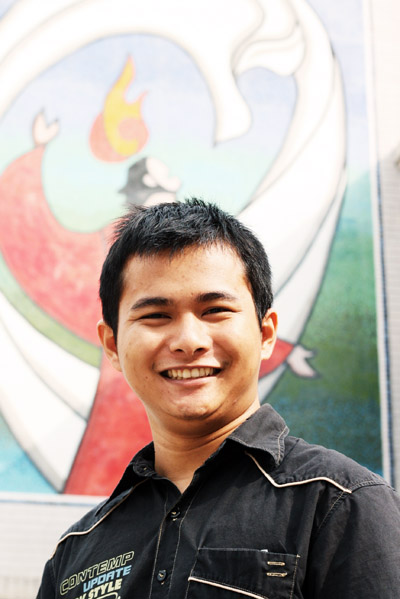
Why do you say that?
So, it’s not that tough. Not that scary. Maybe, maybe it’s tough but for me maybe I feel like, OK, since I have to study [as a] masters student and we have reached the level of maturity therefore, you know, you have more high responsibility. Though, a lot of homework, you know, I have at least three homework [assignments] every week but I don’t feel that it’s so too much for me. I can manage it well. I can do it well. So, I told my friend or someone who would like to come to Providence University that OK. It’s not tough and also Providence University they offers scholarship for every international student to study here.
So, what kind of business you will be interested in the future?
For me I would like to work in the company being like a business consultant, business analyst.
To run what kind of business?
Maybe in a research company helping the company? Maybe helping the clients to solve their problems? Maybe they have a problem that, OK, how can I marketing my product or what is the market strategy to make my product successful? So, I am the one who can give them the answer because I have knowledge in statistics. And I can give them the useful information to help them finding the solution.
So, a business consultant or financial consultant like that?
Exactly because in Taiwan they have so, so many consulting firms, top class consulting firm in Taiwan. So many companies in Taipei. My goal is that, OK, I will work there sometime but it doesn’t mean that I came to Taiwan because I wanted to work in Taiwan. No, it’s not that. Because one important factor is that I just realized [is] that to study Chinese, to speak good Chinese fluently…two years is not enough. Maybe I have to stay here about four or five years to learn about [the] Chinese language. And anyway I think two years is not enough to learn about the attitude of Taiwan people that Taiwan culture. You know, you, okay you cannot say that “OK. I’ve been in this country for three months for half a year and I know everything about the country.” No, it’s just an exaggeration. It’s not true. You…because culture …it takes time to understand. Because I think if you come to Taiwan and speak English with Taiwan people I think the result may be the way of thinking of them it completely different when you talk with them in Chinese.
I heard that you can also speak good German? So have you thought about going to Germany to study there?
I think about it in the future but it’s just only in the future because I think I should pay more attention for Taiwan. Maybe Germany is OK. Maybe in the next five years, 10 years I don’t know. Or, maybe I will study my PhD in Taiwan? I don’t know the future.
So, why did you learn German?
During [my high school years] it was quite fashionable for students to go abroad and get the third language. And, during that time I think my…choices are Taiwan & Belgium.
So, why did you choose German for studying?
For me I wanted to learn another language, a third language – because for me English is not enough. So, I would like to learn more.
And, why did you choose Germany?
Because during that time I thought I would like to be an engineer and in Germany engineering is so famous. … During that time I think most of my friends they went, you know, like to the USA or maybe Switzerland to France [or] may be some other English‐speaking country. But for me, yeah, I will try, try something new. I would like to learn more.
So, compare German and Mandarin which language is harder to learn?
Chinese – definitely. During the time when I lived in Germany I took just only two months to speak.
So, you lived in Germany?
Yeah, one year. Exchange student, but I had to study in a German high school and everything was totally German, no English.
You have a scholarship to go there?
Yeah, because an organization offered me quite a lot of money to study there and they support me.

Wow! You must be so good.
Yeah, I think that I am good but I think I am the one that would never let the chance go…
So, after you got your bachelor’s degree didn’t you ever consider going back to Germany?
I thought about it so many times but in Germany for the academic studies it’s quite different from other countries in the world. Because, in Germany, if you would like to study a baccalaureate degree you have to spend a really long time to graduate because it doesn’t mean you graduate from baccalaureate you will get a baccalaureate. No, it’s not. In Germany if you graduate from baccalaureate program you will get all together a baccalaureate and a master’s. But, anyway, it’s very tough in Germany because if you don’t pass the subject you have to repeat one year or two years in that university. I have one of my good friends in Germany during that time I think now he’s 26 already but still has not graduated from the baccalaureate program yet. Yeah, so I feel like “Oh, my God!” I spent my time there. I could be getting so [exhausted] and old. Because, for me, you know, health is important. Though you have a good job in good academic background…if your health is not good how can you live in this world so long? So, it's one factor I considered.
So, compare them: Taiwan looks like it is the best. Not that tough but also very valuable, very helpful and… you know, sometimes I feel like it’s just destiny.
Why?
Something that I never expected before. During the time that I studied in my high school in Germany there were a lot of Taiwan students in German schools. A lot. At least 10 of them because their parents want them to learn to be able to speak English. But not only English to [also] be able to speak German. And they would like them to study some technical field like engineering or something. But I have known one Taiwanese girl in Germany. She said that when she came there she spent a few years – I think one or two years already – but she could speak and five languages. And she was so talented and she said, I asked her, “Do you live with your parents?” “No.” She lives with her teachers. So, you know, she you really at that age she looks so mature…
Yeah, and she has good ability. She can do whatever she wants. That’s why you think, that’s destiny because she’s from Taiwan to…
Yeah, because I never expected that I would study in Taiwan, you know, but maybe it started from that point.
You saw so many good things from Taiwan people, students…
It’s quite funny. During that time in Thailand F4, Jo Lin Tsai…
Joe Lin is also famous in your country?
But not as famous as FE four. Because, you, I’d bet people at my age or a little bit younger or a little bit older everyone knows F4 and they come to Taiwan because of F4. Because, I have, I have, I have I think one of my friends she’s Thai but now she studies law at Taida. She said that [she studies] Chinese because of F4. Yeah, and just in five years her Chinese is so perfect. And she studies law in Chinese at Taida.
What else do you want to tell the other students considering to study abroad about Taiwan & Providence University?
I would like to tell any international student from any country it doesn’t matter who you are but I can guarantee that Taiwan is one of the best countries to study in and I can guarantee that you will not have any culture shock in Taiwan and the people are so nice. You just come here. And also for Providence University their tuition fee is not so expensive it is quite similar or even so much cheaper than your hometown and they can give you a quite high [academic] standard. And also for the one who seeks for the scholarship even though you cannot win the Taiwan government scholarship you can have or hold the Providence University scholarship. Even though you don’t win any scholarship you can just simply study in Taiwan – their tuition fee is not so expensive.
So, how much to study in these similar kind of program. An MBA program in your country?
50,000 to 70,000 Taiwan dollars per semester.
Similar!
Yeah. Similar, yeah.
So better to come here your tuition will be free. You can save at least 50,000. Tell all your people here.
Yeah, exactly.




